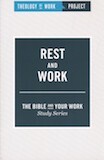God’s Prescription for Workaholics
Blog / Produced by The High Calling
We are a society addicted to work. Our culture worships a god of productivity, or more accurately a god of frenzied activity. Even our pastimes of supposed "recreation" are often compulsive activities that keep us busy nonstop.
Busyness is our badge of honor. We boast about how tired and overspent we are, as though it were something to be proud of. Even when we complain about being overly busy, we are often actually boasting. We want people to know we are as busy as they are—and therefore just as worthwhile.
These frenzied lifestyles are so central to our culture, but they are destructive. And unbiblical: they are costly to us as individuals, destructive of our relationships with God and one another, and damaging to the earth on which we live.
Frenzied Lifestyles Create Frenzied Relationships
It doesn't take too much effort to see this. We have the disease of frenzy. Symptoms include divorce rates and fractured homes, tension and psychological illness, shallow relationships, and massive environmental degradation. Consider the number of artificial stimulants needed just to give people "energy" to get through their busy days—and then we need more chemicals to calm them down at the end of it.
Our busyness also requires that we continue to consume and exploit resources at an unprecedented rate. Indeed, I would add that one reason many of us stay busy is to earn more money to enable us to consume more resources and satisfy more of our desires to possess. We have an endless cycle: work and consume, spend and consume, work and consume, spend and consume.
In our honest moments, we may be willing to acknowledge the cost of our busyness. But that doesn't mean we do anything about it. Even more sadly, this aspect of our culture seems as pervasive inside the church as outside. Children in Christian homes are often busier than their nonchurched peers; they have the same sports, theatre, dance, and music activities, with youth group, church, and mission trips thrown in. As for adults, we even have a spiritual sounding name for our frantic lives: we call it the "Protestant work ethic."
The Healing Power of Rest
Yet when we look at a biblical model of godly work and godly living, we see a marked contrast. Promises of rest are central to the promises of God. Rest is part of God's plan for us. He intends it for us. Jesus promises: "Come to me, all you who are weary and burdened, and I will give you rest." A Psalmist even associates rest with salvation: "My soul finds rest in God alone; my salvation comes from him" (Ps. 62:1). On the flip side, when God removes rest, it is a punishment. When Cain kills Abel, God makes him a "restless wanderer."
Rest is good. It is necessary. It is healing. Rest is from God. The importance of rest is not just a side note of Scripture–not some trivial idea that God added as an afterthought. The importance of rest is woven into the very fabric of creation. In Genesis 2:2-3 we read, "By the seventh day God had finished the work he had been doing; so on the seventh day he rested from all his work. And God blessed the seventh day and made it holy, because on it he rested from all the work of creating that he had done."
It is common to read the creation account of Genesis and to think humans are the culmination of creation—as though everything prior to our arrival in Eden had no other purpose except to lead to us. We think creation was completed on the sixth day. The seventh day is a sort of anti-climax that happens after the important stuff.
But the climax of creation is not the sixth day. The climax is the seventh day, the day of rest. God's rest is not a static rest, or a simple cessation of activity, but an active rest. It is a state of delight in creation. That sense of delight is part of the biblical concept of menuha (the Hebrew word for rest). God finishes his creation when he takes delight in it.
Healthy Work Includes Rest
Think through this again. God's creative work is not complete until he creates rest. Work is good. God himself works. But the culmination of work is rest—even for God! And so in Scripture we see a regular cycle of work, and then rest—a rhythm inherent in creation itself. Not just for humans, but for animals as well. Even for the land. God commanded that the land be given a rest every seven years. Nothing should be planted. In rest, we enter most fully into the appreciation of creation and thus of God's work as creator.
God tells us the best way to start enjoying the rest he intends. Obey the fourth commandment (Ex. 20:8-11): "Remember the Sabbath day by keeping it holy. Six days you shall labor and do all your work, but the seventh day is a Sabbath to the LORD your God. On it you shall not do any work, neither you, nor your son or daughter, nor your manservant or maidservant, nor your animals, nor the alien within your gates." Enjoy the Sabbath, not by sitting in a straight-backed chair reviewing a list of rules of what not to do. Don't even review the list of things you need to do. Put all of that away and rest. Delight in God's creative work: in the goodness of what he has made and given to us.
Questions for personal reflection, online discussion, or small groups:
- Read and reflect on Genesis 2:1-3: "So the creation of the heavens and the earth and everything in them was completed. On the seventh day, having finished his task, God rested from all his work. And God blessed the seventh day and declared it holy, because it was the day when he rested from his work of creation" (NLT).
- Think about your struggle with the disease of frenzy. What specific symptoms have you experienced?
- When do you rest? What temptations prevent you from resting?










